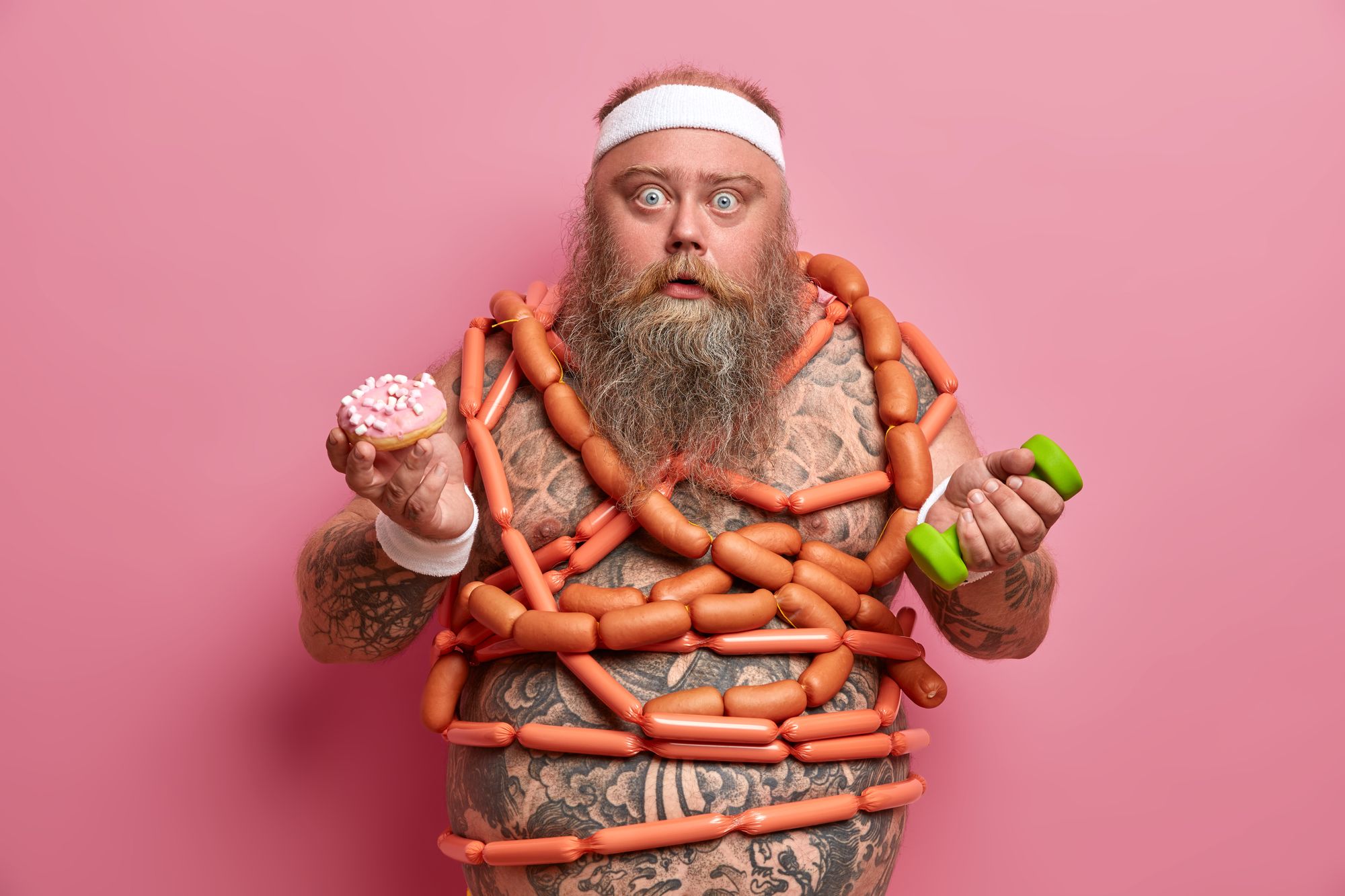Hungry on a Bulking Diet — Should You Increase Calorie Intake?
You're on a bulking diet. You should be stuffed beyond measure — so why are you still so hungry all the time? Should you keep eating? Or not?

You’re on a bulk. You’re convinced you’re eating enough for serious gains (oh, the shred will be so sick — you can already picture it).
The only problem?
Bone-deep hunger. Between meals and, frustratingly, right before bedtime. What should you do? Increase food intake? Or no?
Obviously, the first option would placate your stomach’s incessant and feral growling.
But, at the same time, isn’t there supposed to be an upper limit to how much you should be eating … even if you’re technically on a bulking diet?
Well, to that, we say: you're 100% correct. But consider this. Are you sure you're truly eating enough?
Do you know how many calories you are eating?
There’s no getting around it.
If you’re on a bulking diet, you’ll have to get a good sense of your calorie intake (yes, this means counting those calories!)
So, here’s an exercise you could do to “troubleshoot” your hunger. Track your total calorie intake over a week, then average for a daily number.
Are you averaging between 300 to 500 calories above your maintenance calories?
If you're not, you've found the source of your hunger — you're not eating enough calories!
But what if you are within the range? Then see if you’re on the lower end of the spectrum; if you’re averaging 300 calories above your TDEE daily, you may wish to push your intake closer to the 500 calories in excess region.
What happens if you exceed that calorie range?
OK, but what if you're already eating ~500 calories above your maintenance calories?
What will an increase in your calorie intake do? To understand that, you'll first need to know the typical muscle-to-fat gain ratio on a bulking diet.
Of course, this can vary (and quite a bit!) from individual to individual. A good benchmark for beginner and intermediate lifters is a 50-50 split.
But that’s assuming you’re sticking to a relatively modest calorie surplus.
Take a more aggressive approach with your bulking diet, and research shows you risk gaining a higher proportion of fat mass (compared to fat-free mass or, in other words, muscle mass).
Perfectly illustrating this is a 2019 paper published in the Journal of Human Kinetics, for instance. The researchers randomly assigned participants (male competitive bodybuilders in their offseason) into 2 groups:
- Group 1: Participants ate in a high-calorie surplus of 67.5 calories/kilogram/day
- Group 2: Participants ate in a moderate calorie surplus of 50.1 calories/kilogram/day
To put those numbers into perspective, an individual weighing 70 kilograms would have been eating 4,725 calories in Group 1 and 3,507 calories in Group 2.
All participants performed resistance training 6 times a week. Now, guess what the researchers found after 4 weeks?
+2.7% in muscle mass (2.4 kilograms)
+7.4% in body fat percentage (1.81 kilograms)
👉 Muscle: fat gain ratio = 4:3
Those in Group 2:
+1.1% in muscle mass (1.18 kilograms)
+0.8% in body fat percentage (0.3 kilograms)
👉 Muscle: fat gain ratio = 4:1
While those in Group 1 gained ~ 2x as much muscle mass as those in Group 2, all those gains also came with ~ 6x the fat mass. This finding aligns with a 2013 study published in the European Journal of Sport Science.
But wait. So what if you gain a little more fat?
If you always look on the bright side and see all things as "half-full" (instead of half-empty), then you're probably wondering … well, what's so bad about a little more fat? It comes with 2x the muscle gain! That’s a lot.
TBH, there's no right or wrong way to do a bulking diet.
You can afford to be a little more aggressive with your calorie surplus so long as you understand that:
- You might need to spend a little more time cutting — i.e., chipping away at all that fat gained — at the end of your bulking diet to reveal all your hard work (because bulking and cutting go hand in hand 🤝)
- Carrying excess body fat (note: what’s considered “excess” depends on your biological sex and age) has serious consequences for your health, increasing your risk of developing chronic conditions like type 2 diabetes, heart disease, stroke, and fatty liver disease
Tips on managing hunger on a bulking diet
Uninterested in nudging your daily calorie intake up?
Don't worry; you don't have to grin and bear your hunger. Here are a few tips you could incorporate into your bulking diet to boost your satiety without eating more calories.
(Of course, these tips will still be helpful if you’re increasing your calories.)
#1: Choose high-volume foods
For example, you're eating 200 calories of pork chop. Did you know that you could eat nearly twice the volume (read: twice as filling) in chicken breasts for the same number of calories?
That’s because chicken breasts are way leaner than pork chop, which is packed with fat that comes in at 9 calories per gram.
#2: Prioritize sleep
Getting less than 7 hours of high-quality sleep nightly can lead to the hunger-skyrocketing effect of simultaneously:
- Increasing your ghrelin (aka the hunger hormone) levels, and
- Decreasing your leptin (aka the satiety hormone) levels
Meaning?
If you want to stop feeling so hungry all the time, you better get those ZZs in!
Oh, and also, not to scare you, but poor sleep can seriously hurt your muscle gains!
#3: Consider hunger-suppressing foods
Disclaimer — these won't make you invulnerable to food cravings and hunger pangs, but they'll likely minimize their occurrence (which is still helpful!):
• Green tea
• Cayenne pepper
• All sources of capsaicin
Get more details in this article:

Are you really on a bulking diet? 🤨
Are you still reeling over the fact that you’ll need to track the calorie count of every food that goes into your mouth? Just so you know, it doesn’t need to be a whole thing. You don’t have to bother with messy Excel spreadsheets or buggy food databases.
Instead, it could be just as simple as inputting your food intake into GymStreak — and automatically getting a real-time update on your:
- Total calorie intake
- Macronutrient split (protein/fat/carbohydrates)
Sweeter still, GymStreak can also tailor workout plans to your specific needs. Fitness and nutrition support, all in one place. Amazing? 100%.
Workout Programming + Nutrition Tracking, Off Your Hands
*sigh of relief* We'll guide you through it all — step-by-step. Just download the app, and you'll be making progress toward your dream body like never before.
References
Garthe, I., Raastad, T., Refsnes, P. E., & Sundgot-Borgen, J. (2013). Effect of nutritional intervention on body composition and performance in elite athletes. European Journal of Sport Science, 13(3), 295–303. https://doi.org/10.1080/17461391.2011.643923
Iraki, J., Fitschen, P., Espinar, S., & Helms, E. (2019). Nutrition Recommendations for Bodybuilders in the Off-Season: A Narrative Review. Sports, 7(7), 154. https://doi.org/10.3390/sports7070154
Ribeiro, A., Nunes, J. P., Schoenfeld, B., Aguiar, A., & Cyrino, E. (2019). Effects of Different Dietary Energy Intake Following Resistance Training on Muscle Mass and Body Fat in Bodybuilders: A Pilot Study. Journal of Human Kinetics. https://doi.org/10.2478/hukin-2019-0038


